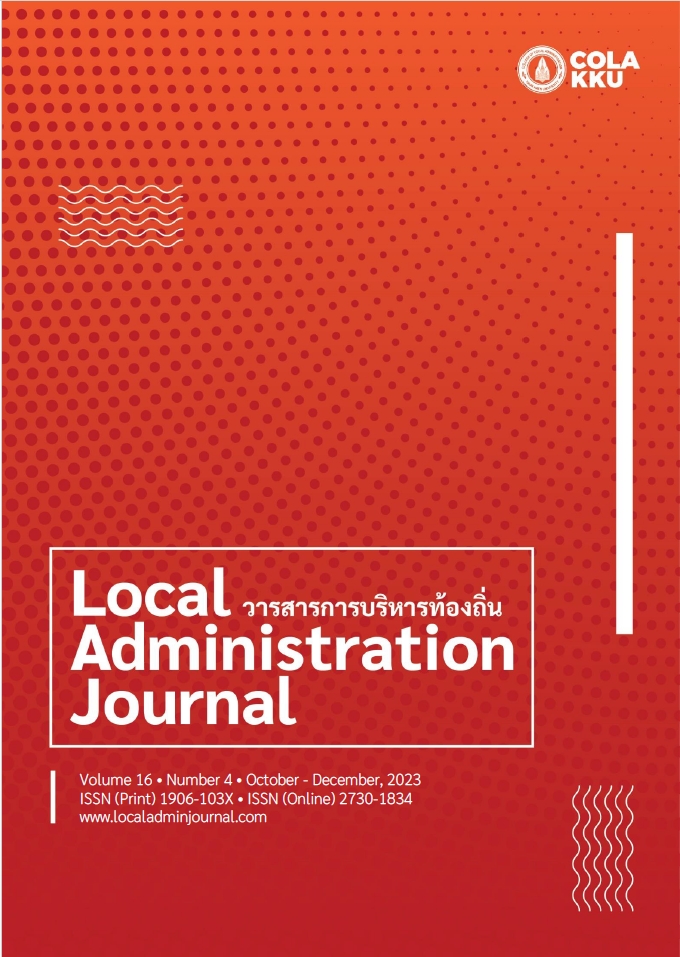แนวทางการยกระดับการดำเนินงานของศูนย์พัฒนาคุณภาพชีวิตและส่งเสริมอาชีพผู้สูงอายุ
คำสำคัญ:
ผู้สูงอายุ, การยกระดับการดำเนินงาน, คุณภาพชีวิตบทคัดย่อ
นับตั้งแต่มีการจัดตั้งศูนย์พัฒนาคุณภาพชีวิตและการส่งเสริมอาชีพผู้สูงอายุ (ศพอส.) ในปี พ.ศ.2557 ยังไม่มีการศึกษาในเชิงระบบเกี่ยวกับการดำเนินงานของ ศพอส. บทความวิจัยนี้จึงมีวัตถุประสงค์เพื่อนำเสนอแนวคิดและนโยบายการจัดตั้ง ศพอส. วิเคราะห์บทบาทหน้าที่และการดำเนินงานของหน่วยงานที่เกี่ยวข้อง ค้นหาปัญหาและอุปสรรคของการดำเนินงาน พร้อมทั้งให้ข้อเสนอเชิงนโยบายเพื่อยกระดับการดำเนินงานของ ศพอส. โดยใช้การวิจัยแบบผสม เก็บข้อมูลด้วยการสัมภาษณ์เชิงลึกกับผู้ที่เกี่ยวข้องกับ ศพอส. และใช้แบบสอบถามเพื่อทราบความคิดเห็นของผู้สูงอายุที่มีต่อการดำเนินงานของ ศพอส. ผลการวิจัยพบว่า รัฐบาลมีนโยบายที่จะให้มี ศพอส. ในพื้นที่ขององค์กรปกครองส่วนท้องถิ่น เพื่อเป็นศูนย์รวมในการจัดกิจกรรมให้กับผู้สูงอายุ เพื่อพัฒนาคุณภาพชีวิตผู้สูงอายุทั้งในระยะสั้นและระยะยาวในพื้นที่ซึงผู้สูงอายุมีภูมิลำเนาอยู่ โดยกรมกิจการผู้สูงอายุมอบหมายให้สำนักงานพัฒนาสังคมและความมั่นคงของมนุษย์จังหวัด ประสานงานและกำกับดูแลการจัดตั้งและการดำเนินงานของ ศพอส. กับองค์กรปกครองส่วนท้องถิ่น ทั้งนี้ ปัญหาและอุปสรรคสำคัญของ ศพอส. ประกอบด้วย ปัญหาด้านภาพลักษณ์และความเข้าใจที่ไม่ถูกต้องของผู้สูงอายุเกี่ยวกับที่มาของ ศพอส. การขาดการให้ความสำคัญกับคุณสมบัติขององค์กรปกครองส่วนท้องถิ่นและศักยภาพของบุคลากรที่จะมาขับเคลื่อนการดำเนินงานของ ศพอส. ปัญหาและข้อจำกัดเกี่ยวกับงบประมาณและบุคลากรสำหรับการขับเคลื่อน ศพอส. การขาดการติดตามและประเมินผลการดำเนินงานที่สามารถสะท้อนผลการดำเนินงานที่แท้จริงของ ศพอส. และไม่สามารถใช้เป็นข้อมูลสำหรับการพัฒนา ศพอส. และปัญหาการพัฒนาอย่างต่อเนื่องและความยั่งยืนของการดำเนินงานของ ศพอส. ข้อเสนอแนะเพื่อยกระดับการดำเนินงานของ ศพอส. ประกอบด้วย 1) กรมกิจการผู้สูงอายุต้องให้ความสำคัญกับการสร้างเครือข่ายความร่วมมือในการขับเคลื่อน ศพอส. 2) กรมกิจการผู้สูงอายุต้องให้ความสำคัญกับการติดตามและประเมินผลการดำเนินงานของ ศพอส. และใช้ผลการประเมินดังกล่าวในการพัฒนามาตรฐาน ศพอส. 3) กรมกิจการผู้สูงอายุจะต้องจัดเตรียมบุคลากรและพัฒนาศักยภาพบุคลากรอย่างเป็นระบบ เพื่อรับผิดชอบงานที่เกี่ยวข้องกับ ศพอส. ในอนาคต และ 4) กรมกิจการผู้สูงอายุต้องพิจารณายกระดับการดำเนินงานของ ศพอส. ไปสู่การเป็นศูนย์ให้บริการผู้สูงอายุแบบเบ็ดเสร็จ
เอกสารอ้างอิง
Anderson, J. E. (2015). Public policymaking: an introduction. (8th ed.). Australia: Wadsworth.
Chareonsook, D. (2015). Aging and Community Health Promotion. Journal of The Police Nurses, 7(2), 280-265. (in Thai)
Chen, T. H. (2015). Practical program evaluation (2nd ed.). Thousand Oaks, CA: Sage
Faikam, K. (2014). Elderly Welfare Management in Thailand. Ph.d in Social Sciences Journal, 4(3), 92-99. (in Thai)
National Committee on Aging. (2010). National Elderly Plan No. 2 (B.E. 2545 - 2021) Revised No. 1 B.E. 2552. Bangkok: Thep Penvanis Publishing. (in Thai)
National Committee on Aging. (2018). National Elderly Plan No. 2 (2002 – 2021) Revised No. 2 B.E. 2018. Bangkok: Samlada Printing. (in Thai)
Office of the Permanent Secretary, Ministry of Public Health. (2017). Guide to Integration of the 4 Ministries Cooperation – Ministry of Interior, Ministry of Social Development and Human Security, Ministry of Education, and Ministry of Public Health, The Development of People Throughout Their Life Span During Old Age. Ministry of Public Health. Bangkok. (in Thai)
Peerayanun, C., & Pattaranarakul, P. (2016). Study of policies and strategic measures for welfare to support the Thai aging society. The SDU research journal on Humanities and Social Sciences, 12(3), 19-37. (in Thai)
Phiboon, K., Piriyapan, P., Phitaksil, M., & Injai, P. (2014). Round-trip service arrangement for seniors in Burapha University Hospital. Retrieved from http://dspace.lib.buu.ac.th/xmlui/handle/1234567890/1668 (in Thai)
Prompak, C. (2013). Aging society in Thailand. Retrieved from https://library.senate.go.th/document/Ext6078/6078440_0002.PDF?fbclid=IwAR0JwyjsURt0lYC_0C-JHTJz_LBhuoffm0lPAEaZeA-DpUdX6sqTTrAjEmw (in Thai)
Rossi, P.H., Freeman, H.E. & Lipsey, M.W. (1998). Evaluation a systematic approach. (6th ed.). Thousand Oaks, CA: Sage.
Stufflebeam, D. L. (2000). The CIPP Model for Evaluation. In D. L. Stufflebeam, G. F. Madaus, & T. Kellaghan (Eds.), Evaluation Models: Viewpoints on Educational and Human Services Evaluation (pp. 279-317). Dordrecht: Springer Netherlands.
The Department of Elderly Affairs. (2017). Standard Operating Guide of Life Quality Development and Profession Promotion Centers for Older Persons. Bangkok: The Department of Elderly Affairs. (in Thai)
The Department of Elderly Affairs. (2018). Measures to drive the national agenda on aging society. Samlada Printing House. (in Thai)
The Department of Elderly Affairs. (2021). Care for the elderly. Retrieved from https://www.dop.go.th/th/know/15/741 (in Thai)
The Department of Elderly Affairs. (2022). Numbers of Life Quality Development and Profession Promotion Centers for Older Persons in 2022. Retrieved from https://www.dop.go.th/th/formdownload/7/809 (in Thai)
ดาวน์โหลด
เผยแพร่แล้ว
รูปแบบการอ้างอิง
ฉบับ
ประเภทบทความ
สัญญาอนุญาต
ลิขสิทธิ์ (c) 2023 วารสารการบริหารท้องถิ่น

อนุญาตภายใต้เงื่อนไข Creative Commons Attribution-NonCommercial-NoDerivatives 4.0 International License.
บทความทุกเรื่องที่ได้รับการตีพิมพ์ทั้งรูปเล่มและบทความออนไลน์ เป็นลิขสิทธิ์ของวิทยาลัยการปกครองท้องถิ่น มหาวิทยาลัยขอนแก่น



